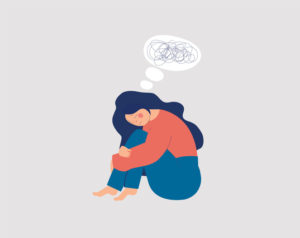Borderline personality disorder (BPD) is a complicated and challenging diagnosis. While it (and other personality disorders) are still highly stigmatized, they are also equally misunderstood. The symptoms and causes of BDP can be incredibly enigmatic and varied.
Understanding the challenges presented by BPD is essential in identifying its symptoms and navigating a path towards healing as early as possible. However, it is still a complex situation that may present itself in various ways depending on the individual it is affecting, the symptoms being presented, and the causes of its development.
What Is Borderline Personality Disorder?
Borderline personality disorder is a long-term personality disorder that can manifest at a young age and impact individuals into their teenage and adult years until addressed. Those suffering from BPD can experience an altered perception of the world and the people around them.
As a result, it is often coupled with many other complications, with anxiety disorders and depression being especially common. However, each individual suffering from the disorder will have their own unique symptoms pertinent to their circumstances stemming from the development of the condition.
The behaviors that result from the disorder can be difficult to overcome if only addressing the symptoms. Overcoming the patterns in an individual’s behavior is best approached by tackling the condition in its entirety, including the psychological and environmental factors at play. However, because no definitive test can diagnose an individual with BPD, being aware of its symptoms and causes is paramount in identifying and addressing it as early as possible.
The Causes and Symptoms of BPD
There is no single source that will necessarily cause BPD. Instead, it is best understood to be a combination of multiple factors: environmental impacts during childhood, brain chemistry, and genetic predisposition.
Environmental sources can be numerous, stemming from dangerous childhood experiences to trauma. Sexual, physical, and verbal abuse; neglect; or the separation of parental figures can all be extraordinarily difficult for youths to process and fundamentally affect how they may approach their self-image and perspective on relationships of all kinds moving toward adulthood.
One’s brain chemistry can also impact the development of BPD. Chemical imbalances in the brain can make it difficult to moderate one’s emotions, potentially causing some of the unique symptoms of the disorder. This can also be further exacerbated by a genetic component, as having family members who suffer from the condition can increase the likelihood of developing it oneself.
The Symptoms of BPD
Each individual may express BPD uniquely, making addressing and overcoming the disorder a very personalized effort. However, recognizing the symptoms can help each individual get the appropriate assistance as early as possible. Some of the symptoms or concurrent disorders of BPD may include:
- Rapid mood swings
- Impulsive and dangerous behavior
- Intense feelings of anger
- Anxiety
- Depression
- Compromised self-image
- Self-harm
- A pervasive feeling of “emptiness”
- Development of eating disorders
- Substance abuse
- Symptoms of post-traumatic stress disorder (PTSD)
- Inconsistent perception of own identity
BPD also dramatically affects how an individual approaches relationships in their lives. Those suffering from BPD may have difficulty regulating themselves in relationships of all kinds. From romantic involvement to friendships and familial bonds, they often seem to act rashly on perceived feelings and fears of abandonment. This perspective can lead to behaviors that seem overly protective, clingy, or overbearing, and one may act irrationally when faced with these fears of being left alone.
One’s emotions about a relationship can fluctuate quickly, moving through feelings of being utterly enamored with a significant other to expressing words of devaluation. This makes understanding and addressing these relationships complicated. While these behaviors can push others away, feelings of abandonment can become more prevalent, creating a complex cycle to break.
Taking the First Step
Overcoming borderline personality disorder is a complicated journey, but it is necessary to address one’s perceptions of themselves and their relationships to reform a healthy outlook on one’s life. While each journey will be unique, it is crucial to be aware of the various paths available.
Depending on one’s presented symptoms and behaviors, utilizing a residential facility may be necessary to ensure one’s environment is a safe and secure place to address vulnerable and sensitive topics. It is also important to have specialized therapeutic techniques and therapy sessions available to create a new overall outlook on one’s life.
Cognitive-behavioral therapy, dialectical behavioral therapy, and mindfulness practices can help create a baseline to explore further one’s individual needs and goals. Stabilization techniques or medication can also be used to help an individual regain control over impulsive behaviors and practice effective decision-making and grounding strategies if necessary.
Borderline personality disorder is incredibly complicated, and it can have a significant adverse effect on one’s life and the lives of those around them. If you or a loved one are struggling with borderline personality disorder and are ready to take the first step towards overcoming it, we at Avalon Malibu can help you today. We offer specialized therapeutic programs, all incorporating a personal element to help address your individual needs and goals for recovery while working on appropriate strategies to address your unique symptoms. Your time with us can be personalized with various approaches, from cognitive behavioral therapy, individual and group sessions, family therapy, somatic experiencing, and more. For more information on the multiple ways we can help you take the first step towards your recovery, or to speak to a caring staff member about the various options available to you, call to talk to us today at (844) 857-5992.










